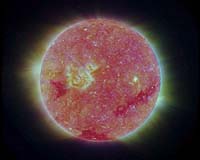 |
Moscow (AFP) April 19, 2010 Russian scientists acknowledged Monday that solar research satellite Koronas-Foton has been lost due to technical problems, barely a year after its launch. The probe, also known as CORONAS-Photon, was launched into orbit by Russia on January 30, 2009 but lost connection with its controllers at the end of the year when a problem with its solar power led to battery failure. "The probe has not functioned for almost five months which allows us with a good deal of certainty to announce its final death," said its creators, the Laboratory of X-Ray Astronomy of the Sun of the Russian Academy of Sciences. It said that in early April the probe's batteries had the chance to be well charged by the sun but it still failed to make contact with the earth. The probe had hoped to investigate energy accumulation in the sun's atmosphere, solar flares and the relationship between solar activity and magnetic storms on Earth.
Share This Article With Planet Earth
Related Links Solar Science News at SpaceDaily
 Building A Space Weather Forecasting System Using STEREO And ACE
Building A Space Weather Forecasting System Using STEREO And ACEGlasgow UK (SPX) Apr 16, 2010 Scientists from the University of Leicester have used observations from NASA's STEREO and ACE satellites to come up with more accurate predictions of when blasts of solar wind will reach Earth, Venus and Mars. Anthony Williams presented the results at the RAS National Astronomy Meeting in Glasgow. Recently, we have recently been experiencing an unusually quiet and long-lasting solar minimu ... read more |
|
| The content herein, unless otherwise known to be public domain, are Copyright 1995-2010 - SpaceDaily. AFP and UPI Wire Stories are copyright Agence France-Presse and United Press International. ESA Portal Reports are copyright European Space Agency. All NASA sourced material is public domain. Additional copyrights may apply in whole or part to other bona fide parties. Advertising does not imply endorsement,agreement or approval of any opinions, statements or information provided by SpaceDaily on any Web page published or hosted by SpaceDaily. Privacy Statement |